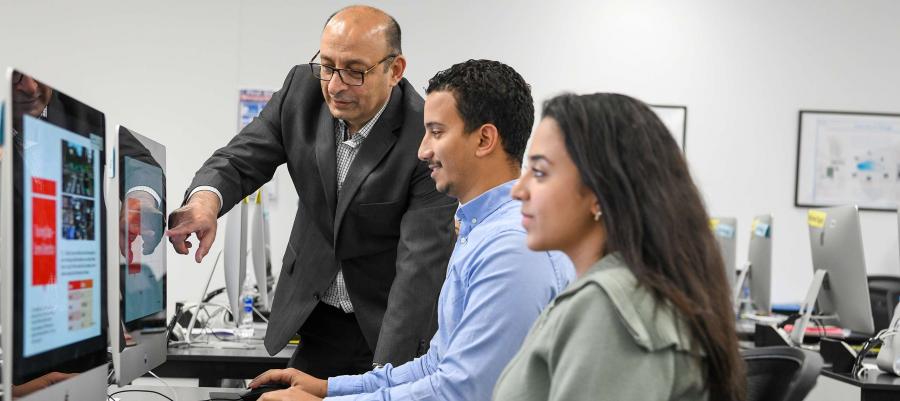- About
- Admissions
- Study at AUS
- Prospective Students
- Bachelor's Degrees
- Master's Degrees
- Doctoral Degrees
- Admission Publications
- International Students
- Contact Admissions
- Grants and Scholarships
- Sponsorship Liaison Services
- Testing Center
- New Undergraduate Student Guide
- Undergraduate Orientation
- New Graduate Student Guide
- Graduate Orientation
- File Completion
- Payment Guide
- Students with Disabilities
- Executive and Continuing Education
- Academics
- Life at AUS
- Research
- Publications
- Contact Us
- Apply Now
- .

Big data leads to big opportunities for AUS students and researchers
With digital information now being generated at a frequency inconceivable even just a decade ago, a new wave of data experts is finding new and novel ways of exploiting this data avalanche, to the benefits of individuals and organizations across the globe. For a group of researchers and their students at American University of Sharjah (AUS), the data revolution is helping advance breakthroughs in areas as diverse as food supply, rail safety, diabetes management and driver safety. Students at the university are also being given the opportunity to embrace the new technologies arising out of big data developments. The AUS College of Engineering is updating the curriculum of several of its programs to ensure that its graduates are at the helm of big data innovations.
The volume of digital data produced daily is beyond what most of us can comprehend. A single jet engine can generate more than 10 terabytes of data every 30 minutes of flight time, and the databases of Facebook alone ingest around 500 terabytes of new data every 24 hours (a terabyte is approximately equal to one trillion bytes). However, according to Dr. Hussam Alshraideh, big data expert and Associate Professor in AUS’ Department of Industrial Engineering, it is not the volume of data that matters, but rather the way in which data is used: “It is not the amount of data that is important, but what organizations do with the data that that makes it valuable. Optimal analytics of big data helps organizations harness their data and use it to identify new opportunities. This leads to smarter business moves, more efficient operations, higher profits and happier customers.”
Helping students understand the best way to harness and interpret data so organizations can use it effectively is a priority for AUS faculty. Graduates of the university’s Master of Science in Engineering Systems Management program are well-equipped to work in important data-related fields such as descriptive analytics, data mining and predictive analytical—all methods that can be used to address business problems. In the AUS PhD in Engineering Systems Management program, students learn how to utilize software for the manipulation, storing and analysis of big data. There are also plans to update the curriculum of several industrial engineering courses, along with the expected launch of a dedicated data analytics course for industrial engineering students.
The university’s commitment to big data teaching and research is seeing AUS graduates occupy a number of sought-after data-related roles in the Middle East and further abroad. Companies are increasingly seeing the benefit that comes from big data analytics, and are seeking highly skilled employees to help reap the advantages of big data, such as cost reductions, faster and better decision making, and the development of improved products and services that better meet customer needs. AUS graduates have gone on to become data managers, data consultants, market knowledge managers, chief data officers, data architects and business and marketing analysts. Mahmoud Qawasmi, a student in the AUS Master of Science in Engineering Systems Management program, is also working as a Project Manager at the Ministry of Education in the Educational Data Center. He said of his current studies:
“The technical courses introduce many new and advanced techniques, allowing me to excel in my technical work. These include advanced data analytics and data mining. The program is tailored to match the needs of engineers who are handling, or willing to handle, both the technical and managerial tasks. I do really enjoy the ability to see what is hidden within the data sets and to lead projects. I hope this work will help to take the UAE’s educational system to the next level and bring it closer toward the fourth industrial revolution.”
For the wider population, leaps in big data research, including that being undertaken at AUS, will have increasing influence on the way in which we all live our lives. Dr. Imran Zualkernan, Professor of Computer Science and Engineering at AUS, is investigating how big data can support artificial intelligence and machine learning. According to Dr. Zualkernan, the Internet of Things (IoT)—the billions of physical devices connected to the internet, collecting and sharing data—is at a tipping point. He believes that big data research in the sectors of energy, education, transportation, technology and the environment will overcome some of the challenges currently facing governments in the Middle East and across the world.
For the UAE, a country that has one of the world's highest levels of traffic fatalities per head of population, big data and IoT could have far-reaching benefits. Dr. Zualkernan and his team have developed a system that automatically detects and reports accidents using the driver's mobile phone. Efforts are also underway to develop a wireless Social Internet of Vehicles (SIoV) to warn drivers about dangerous behavior of nearby vehicles by retrieving data from each vehicle and the use of machine learning techniques.
“Advances in big data are happening daily. It is a source of great pride that the UAE is at the heart of some of the most important breakthroughs in big data and IoT research and that parts of the UAE community will be some of the first to benefit from this new technology,” Dr. Zualkernan said.

